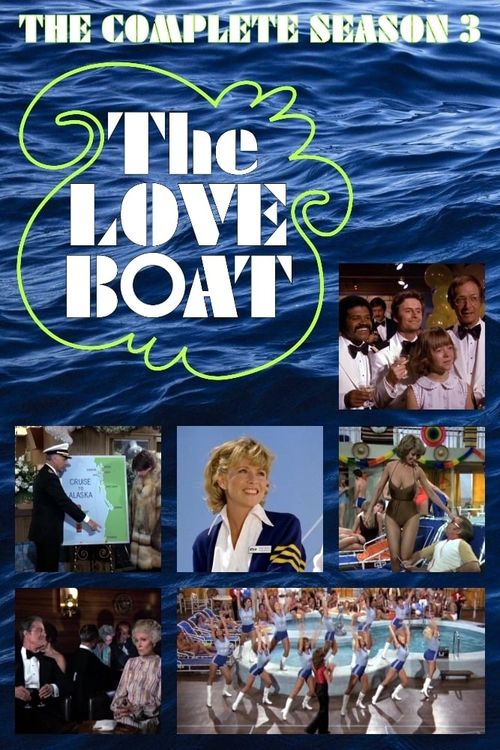Welcome to Retro Television Reviews, a feature where we review some of our favorite and least favorite shows of the past! On Wednesdays, I will be reviewing the original Love Boat, which aired on ABC from 1977 to 1986! The series can be streamed on Paramount Plus!
This week, Maureen McCormick returns to The Love Boat!
Episode 3.23 “Another Time, Another Place/Doctor Who/Gopher’s Engagement”
(Dir by Allen Baron, originally aired on March 1st, 1980)
Mrs. Elliott (Audrey Meadows) boards this week’s cruise with a very specific mission in mind. She wants to find a husband for her daughter, Celia (Maureen McCormick). Mrs. Elliott, whose husband owns a good deal of stock in the cruise line, at first eyes Doctor Bricker as a possible suitor for her daughter, despite the fact that the doctor is considerably older than Celia and has been divorced multiple times. However, Celia is far more charmed by Gopher, who asks Celia to dance when Julie points out how miserable Celia looks at the ship’s Charleston night.
Celia is charmed by Gopher and, when he accidentally gives her a ring that he’s been carrying around in his pocket, she assumes that he’s asking her to marry him. (The ring was actually lost by another passenger and Gopher was just carrying it around until he could put it in the lost-and-found.) Celia says yes and suddenly, Gopher is engaged! Mrs. Elliott is not happy about this, as Gopher is only an assistant purser. As for Gopher, he tries to get out of the engagement by having Isaac tell Celia that Gopher’s a drunk. This only makes Celia even more determined to marry Gopher (so she can “save” him) and this also gets Gopher in trouble with the Captain who, as the show sometimes remembers, is a recovering alcoholic.
Fortunately, Isaac eventually tells Celia the truth about what’s going on. Celia is surprisingly forgiving, returning the ring and announcing that she and Gopher will always be good friends. Celia also finds the strength to tell her mother to let her live her own life. Mrs. Elliott is okay with this, because she has another daughter who needs a husband and Doc is still single.
This was a storyline that depended too much on everyone involved acting like an idiot. Those are my least favorite stories. But, just as with last week, Fred Grandy got to show off his tragic clown qualities and Maureen McCormick was so convincing in her role that it was hard not to suspect that perhaps she related to a character who was tired to everyone assuming that they knew what was best for her and her life.
Speaking of storylines that required everyone to act like an idiot, this episode also featured Bert Parks as Dr. Michael Mervey, a noted sex therapist. Dr. Mervey boards the ship under an assumed named and tells the Captain that he just wants to relax and not have anyone asking him for any help with their problems or asking him to autograph his book. However, Evelyn Miller (Phyllis Davis) has heard a rumor that Dr. Mervey is on the boat so she boards with the intention of tracking him down and seducing him.
The only problem is that Evelyn doesn’t know what Dr. Mervey looks like. (I find that hard to believe, considering how famous Dr. Mervey is supposed to be.) When she hears Isaac refer to another passenger (Arte Johnson) as being a “doctor,” Evelyn assumes the passenger must be Dr. Mervey. But instead, he’s just Wilfred Johnson (Arte Johnson), a nerdy nuclear physicist. At first, Dr. Johnson pretends to be Dr. Mervey but when the real Dr. Mervey inevitably spots Evelyn and starts to hit on her, the truth comes out. Evelyn dumps Wilfred. Feeling guilty, Dr. Mervey tries to give them a therapy session. Neither wants to listen to Dr. Mervey but they do still realize that they actually love each other. Wilfred and Evelyn leave the cruise arm-in-arm and Mervey pats himself on the back for a job well-done.
Again, this plot was way too dependent on everyone acting like an idiot. That said, Bert Parks made me laugh as the self-important Dr. Mervey.
Finally, Jane Wyman stars as Sister Patricia, a nun who is heading to Acapulco to be a teacher. When she discovers that her ex-boyfriend, Steve Brian (Dennis Morgan), is on the cruise, she is forced to reconsider her decision. In the end, she decides to follow her calling but she tells Steve that they’ll be reunited in another time and another place. When Stubing comforts Steve, Steve replies that, “if” there’s a Heaven, they’ll be reunited.
Uhmm…. Steve, if there is a Heaven, it’s probably not full of agnostics. Just saying.
Anyway, this was a simple story and I could tell where it was going to go from the first minute the Steve greeted Patricia on the boat but it worked because of the old school charm of Dennis Morgan and Jane Wyman. These two Hollywood veterans knew just how to best embrace the melodrama.
Thanks to Wyman and Morgan, this was a pleasant cruise. Hopefully, next week will be just as pleasant.

